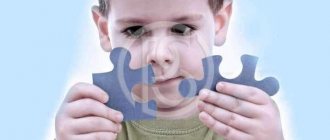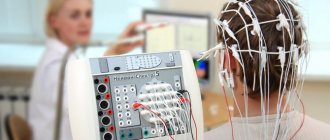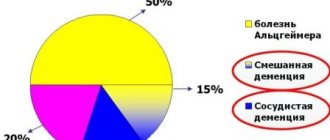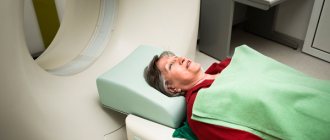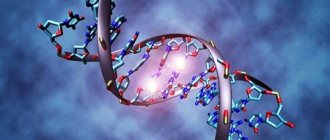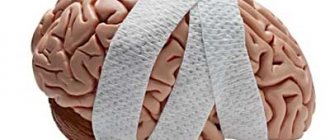Read on this page:
This is a disorder of brain activity that leads to unpleasant consequences:
- decreased mental abilities
- forgetfulness
- inability to self-care
These signs of senile dementia are dangerous for older people, as well as for those around them. Old people suffering from this disorder often get lost and go missing because they cannot find their way home. Often, older people with dementia do irresponsible things, such as leaving electrical appliances and gas stoves on. They need constant supervision. According to WHO estimates, 35 million pensioners are diagnosed with dementia. According to preliminary forecasts, by 2030 the number of patients with this diagnosis will increase to 67 million people.
Description of the pathology
Senile or senile dementia of old age is considered a serious disease. Another name for it is dementia. It should be noted that it is not so much the patient himself who suffers from it, but the people who have to care for him. The sick person needs round-the-clock supervision. He cannot be responsible for his thoughts and actions. When diagnosed, the following are observed:
- loss of acquired knowledge;
- loss of previously acquired capabilities;
- inability to learn something new.
How vivid the symptoms of the pathology will be largely depends on the age and individual characteristics of the human body. The course of the disease is also influenced by which area of the brain was affected and how extensive and deep the lesion is.
Medications for dementia
Standard home treatment for advanced senile dementia involves managing symptoms. Here are some of the main medications to relieve dementia:
- Donepezil. Improves mental function (memory, attention, ability to interact with others, speak, think clearly and perform daily activities) by increasing the production of a natural substance in the brain.
Donepezil may improve the ability to think and remember or slow their loss. It is usually taken once a day, regardless of meals, before bed, at approximately the same time.
- Rivastigmine. Affects the ability to remember, think clearly, communicate and perform daily activities and may cause changes in a person's mood. The drug improves mental function (memory and thinking) by increasing the mass of a certain substance in the brain. Rivastigmine comes in capsule and oral solution form. It should be taken twice a day with meals, morning and evening.
- Akatinol memantine . It works by reducing abnormal activity in the brain. May improve the ability to think and remember, slowing down the loss of these abilities in the future. Akatinol memantine is available in the form of tablets, solution and capsules for oral administration. The solution and tablet are taken once or twice a day, the capsule - once a day, regardless of food, every day at approximately the same time.
All dosages are prescribed as prescribed by the attending physician . Using any of these medications can temporarily stabilize the symptoms of dementia, but there are some patients who cannot take these medications due to intolerance to the side effects.
COST OF TREATMENT FOR MENTAL DISEASES
The duration of treatment in a hospital is from 14 to 90 days, depending on the severity of the disease.
OUTPATIENT TREATMENT
TREATMENT IN A HOSPITAL
AMBULATORY TREATMENT
Ambulatory treatment
| psychiatrist | FOR FREE |
| Consultation with a psychiatrist (first appointment) – free of charge during hospitalization | 3,000 rub. |
| Full psychodiagnostics (all tests and procedures) | from 5,000 rub. |
| Appointment with the head physician of the clinic | 4,500 rub. |
| Consultation with a psychiatrist at home | from 4,000 rub. |
TREATMENT IN A HOSPITAL
Treatment in a hospital (from 14 to 90 days)
| Delivery to hospital with psychosis | FOR FREE |
| Standard room (up to 3 people) | RUB 2,100/day |
| Superior room (2 people) | RUB 2,350/day |
| Room for 1 person (Premium) | RUB 3,200/day |
| Room for 1 person (Lux) | from 4,500 rub./day |
FREE CONSULTATION
Folk remedies at home
Oxygen is necessary for life, but during the process of respiration, free radicals are formed in cells, which are aggressive oxidizing agents. They damage tissue, including blood vessels in the brain, and cerebrovascular accidents are one of the leading causes of dementia .
It is not necessary to treat senile insanity in a hospital: there are vitamins and supplements that can be used at home.
Antioxidants that neutralize free radicals can help keep blood vessels healthy. Fruits and vegetables are rich in them, but these sources are not enough to protect the brain, so it is recommended to take bioactive food supplements. The most important antioxidants are:
- Vitamin E. A daily intake of 800 IU is recommended.
However, in old age, a dose of more than 400 IU per day is allowed only with the permission of a doctor, as it can increase the likelihood of hemorrhagic stroke (bleeding in the brain). - Vitamin C. The dose for the treatment of senile dementia is 500 mg/day. Among other things, it enhances the effect of vitamin E.
- Vitamin D: For people suspected of having dementia, the recommended daily allowance is 600 IU—about the same amount found in five glasses of milk. However, many people need more as age makes them less sensitive to its effects. To obtain the required dose of the vitamin, you need, for example, to drink half a liter of milk per day and take an additional 400 IU in multivitamins.
- Zinc. Essential for the central nervous system. Its main source is meat. It is recommended to get your dose of zinc from several servings of meat per week, supplemented with a multivitamin of 10 mg per day.
Using a number of natural remedies can help prevent or reduce symptoms.
There are herbs and plants that improve blood circulation in the brain and the transmission of impulses.
Among the main natural resources that help fight senile insanity are the following:
- Ginkgo biloba. Ginkgo extract improves blood circulation in the capillaries of the brain, increases resistance and helps prevent their rupture. Use of this herb at doses greater than 200 mg/day for at least 5 months reduces symptoms of dementia.
- Ginseng . Taking the plant improves the mental state of patients, their memory and concentration. The standard dose of the extract is 600 mg per day, divided into three doses.
- Wheat germ oil . Octacosanol in its composition prevents oxidation of nerve cells and brain degeneration. It is worth taking a tablespoon three times a day.
Certain homeopathic remedies, such as barite carb, conium, phosphorus and others, also prove effective in the treatment of senile dementia.
Find out more:
- about the types of senile dementia;
- what should relatives of a sick person do?
- about the life expectancy of people with this disease.
Signs of dementia in older people
Common signs observed in patients include:
- Memory deterioration - both short-term and long-term. The sick person cannot remember what he did a few hours ago. He is also unable to tell what he did in the past. He fails to remember new information, which makes the further process of development and learning impossible.
- Difficulties with orientation in space, problems with the perception of time. After leaving home, the patient may get lost in an area that is familiar to him. For this reason, relatives have to accompany him constantly.
- Lack of desire to learn something new and interesting. The patient, as it were, puts a block: he protects himself from any information. This is due to the fact that his brain is not able to assimilate it.
If signs of illness appear, the pensioner should be shown to a doctor as soon as possible. The sooner treatment is started, the less likely the disease will progress quickly.
What is senile dementia
Senile dementia is a condition that occurs in older people due to organic damage to the brain (persistent and irreversible damage to its structure and functions). The disease is a mental disorder and is characterized by a decrease in the patient’s intellectual abilities, memory impairment, and personality changes. An extreme form of dementia is senile dementia (colloquially called “senile insanity”), which is accompanied by the appearance of serious mental disorders, complete collapse and loss of the patient’s personality.
Reasons for violation
The pathology is based on organic lesions of the central nervous system. They are caused by diseases that cause the destruction and death of brain cells:
- stroke;
- cerebral atherosclerosis;
- arterial hypertension;
- cancer;
- TBI;
- viral encephalitis;
- AIDS;
- meningitis;
- alcoholism, substance abuse, drug addiction.
People at risk for developing dementia include:
- with a genetic predisposition;
- over the age of 65;
- people with diabetes;
- having bad habits;
- with obesity.
Is it possible to completely cure marasmus and how to do it?
Dementia is not one disease: it includes several brain diseases that have more severe symptoms. Brain cell death is the main cause of all types of dementia .
A person with dementia often causes a lot of distress. He can:
- experience problems with memory and communication.
- suffer from frequent mood swings;
- not being oriented in time and place;
- be confused in judgment.
Senile dementia caused by vitamin B12 deficiency, depression, poor diet, alcoholism or drug poisoning is treatable if these conditions are corrected promptly.
Progressive degenerative diseases of brain cells, such as Alzheimer's, Parkinson's, or the effects of multiple heart attacks, do not have an effective complete cure, but with proper treatment, patients can experience significant improvements in some symptoms such as anxiety, memory loss, and depression.
To the question of whether dementia can be cured, researchers have already spent 50 years trying to find the right answer. Is it possible to find a therapy or medicine that will provide complete recovery from any type of dementia? Researchers hope to find a cure for dementia within the next 5 years.
Symptoms of senile dementia
At the very beginning of the disease, the patient remains critical of what is happening around him and is still able to adequately assess the situation, so he may not notice that something is wrong with him. As the disease progresses, a person notices that his intellectual abilities have sharply decreased. He is unable to solve problems that he previously coped with. He is not able to answer questions that seem simple to everyone.
Difficulties with self-care also invariably appear. The sick person does not know how to set up household appliances, answer phone calls, open the front door, etc. With severe dementia, he cannot dress himself, eat food, or perform hygiene procedures. All care for him falls on the shoulders of relatives and medical staff.
Professional care for elderly people with dementia
When we talk about special institutions for the elderly, municipal wards with old linen and shabby walls immediately come to mind. Loving children under no circumstances want their elderly parents to live in such conditions. There are currently quite a few private boarding houses and sanatoriums that specialize in caring for the elderly. In such boarding houses they create the most comfortable environment for the elderly. They are fed well and helped in solving everyday problems. There is always a doctor on duty nearby, and specialized specialists work. The elderly person is under supervision 24/7. The staff is polite and friendly towards their clients. Private boarding houses guarantee reliable and caring care for people with senile dementia.
Stages of senile dementia
It is important to understand that dementia progresses quickly, so there is no point in waiting for it to go away on its own. This will only make the situation worse. Doctors distinguish three stages of the disorder.
- First (easy). The symptoms are mild, but intellectual activity is noticeably reduced. The person understands that he is sick and agrees to be treated. He is still able to take care of himself.
- Second (moderate). Intellectual impairments become more pronounced. Critical perception of one's own behavior decreases. It is difficult for the patient to use the kitchen stove, the front door, and light switches. If you are not constantly near him, he may harm himself.
- Third (heavy). The disintegration of personality is complete. A person cannot eat or wash himself. He does not understand who is talking to him, he is not able to think or remember. It often gets to the point that he cannot even chew food or walk.





